Leadership and Management: Roles, Theories, and Operational Contexts
VerifiedAdded on 2020/02/17
|16
|5278
|35
Report
AI Summary
This report provides a comparative analysis of leadership and management roles, exploring their characteristics and applications within an organizational context. It defines and contrasts the roles of leaders and managers, highlighting their distinct responsibilities and qualities. The report delves into how leadership and management functions apply in different situational contexts, using Pukka Herbs as a case study to illustrate practical applications. It examines various leadership theories, including situational, system, and contingency theories, and discusses their strengths and weaknesses. The report also covers key approaches to operations management and the roles of leaders and managers in this area, emphasizing the importance and value of effective operations management. Finally, it considers the factors within the business environment that impact operational management, providing a comprehensive overview of the subject. This report is designed to provide students with a clear understanding of leadership, management, and their interrelation in a business setting.
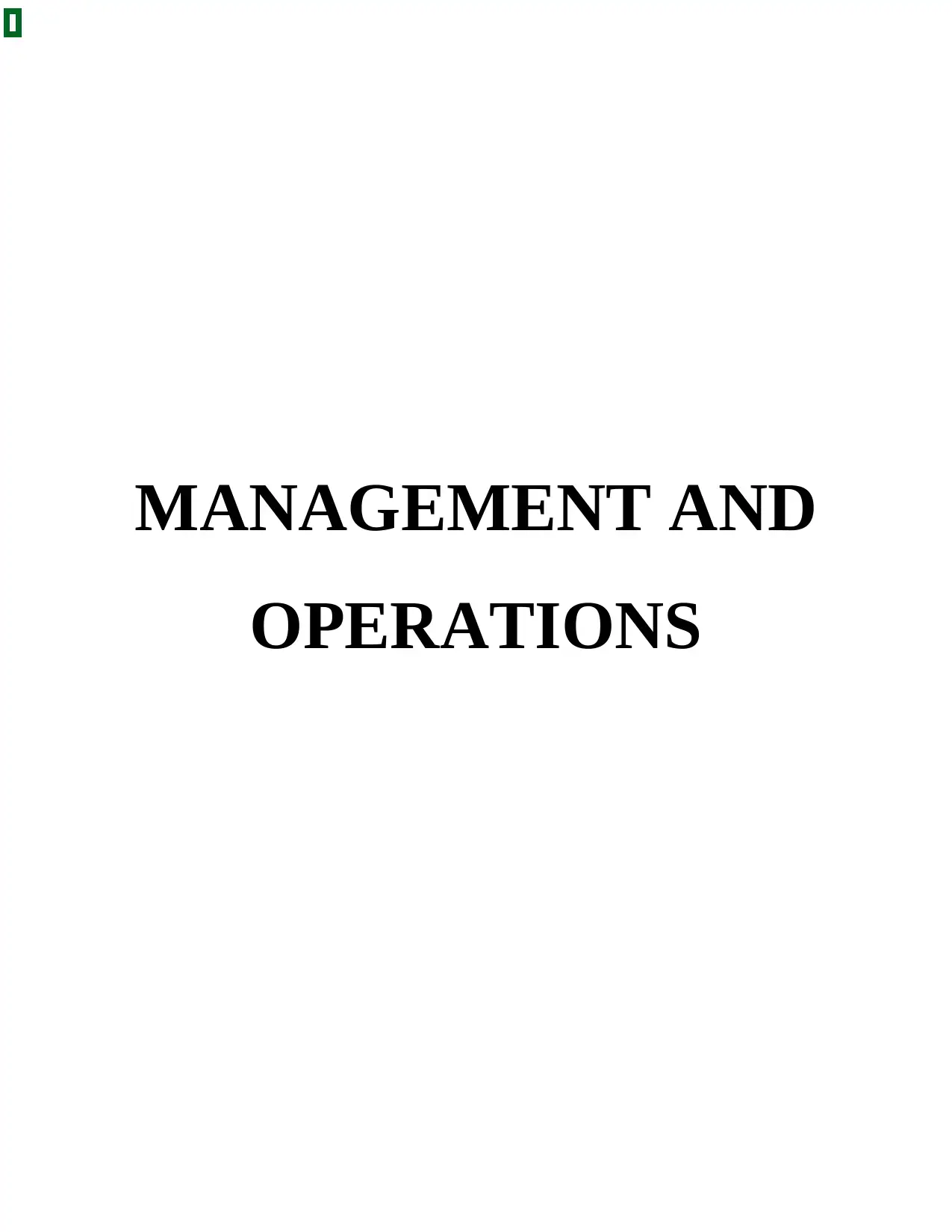
MANAGEMENT AND
OPERATIONS
OPERATIONS
Paraphrase This Document
Need a fresh take? Get an instant paraphrase of this document with our AI Paraphraser
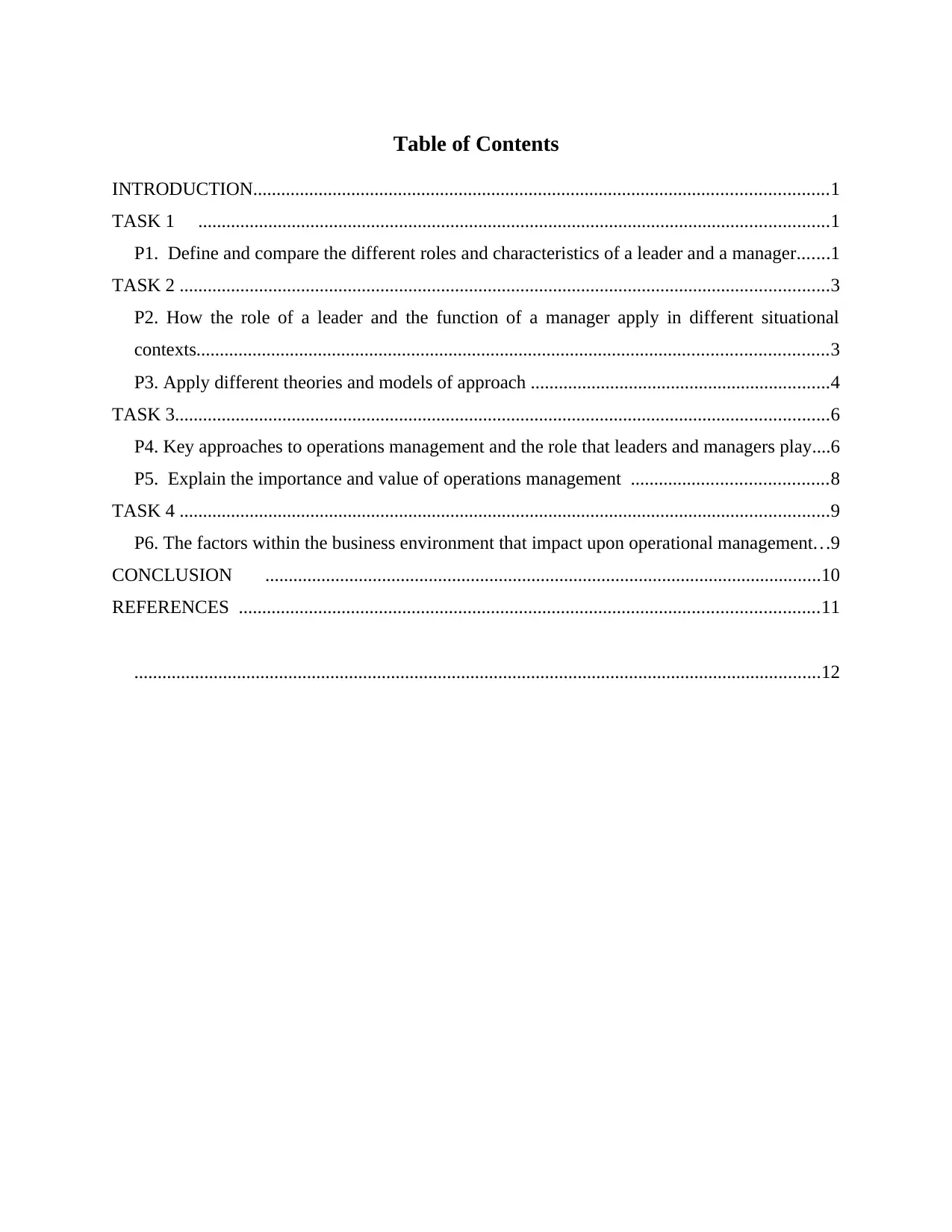
Table of Contents
INTRODUCTION...........................................................................................................................1
TASK 1 .......................................................................................................................................1
P1. Define and compare the different roles and characteristics of a leader and a manager.......1
TASK 2 ...........................................................................................................................................3
P2. How the role of a leader and the function of a manager apply in different situational
contexts.......................................................................................................................................3
P3. Apply different theories and models of approach ................................................................4
TASK 3............................................................................................................................................6
P4. Key approaches to operations management and the role that leaders and managers play....6
P5. Explain the importance and value of operations management ..........................................8
TASK 4 ...........................................................................................................................................9
P6. The factors within the business environment that impact upon operational management...9
CONCLUSION .......................................................................................................................10
REFERENCES ............................................................................................................................11
...................................................................................................................................................12
INTRODUCTION...........................................................................................................................1
TASK 1 .......................................................................................................................................1
P1. Define and compare the different roles and characteristics of a leader and a manager.......1
TASK 2 ...........................................................................................................................................3
P2. How the role of a leader and the function of a manager apply in different situational
contexts.......................................................................................................................................3
P3. Apply different theories and models of approach ................................................................4
TASK 3............................................................................................................................................6
P4. Key approaches to operations management and the role that leaders and managers play....6
P5. Explain the importance and value of operations management ..........................................8
TASK 4 ...........................................................................................................................................9
P6. The factors within the business environment that impact upon operational management...9
CONCLUSION .......................................................................................................................10
REFERENCES ............................................................................................................................11
...................................................................................................................................................12

⊘ This is a preview!⊘
Do you want full access?
Subscribe today to unlock all pages.

Trusted by 1+ million students worldwide
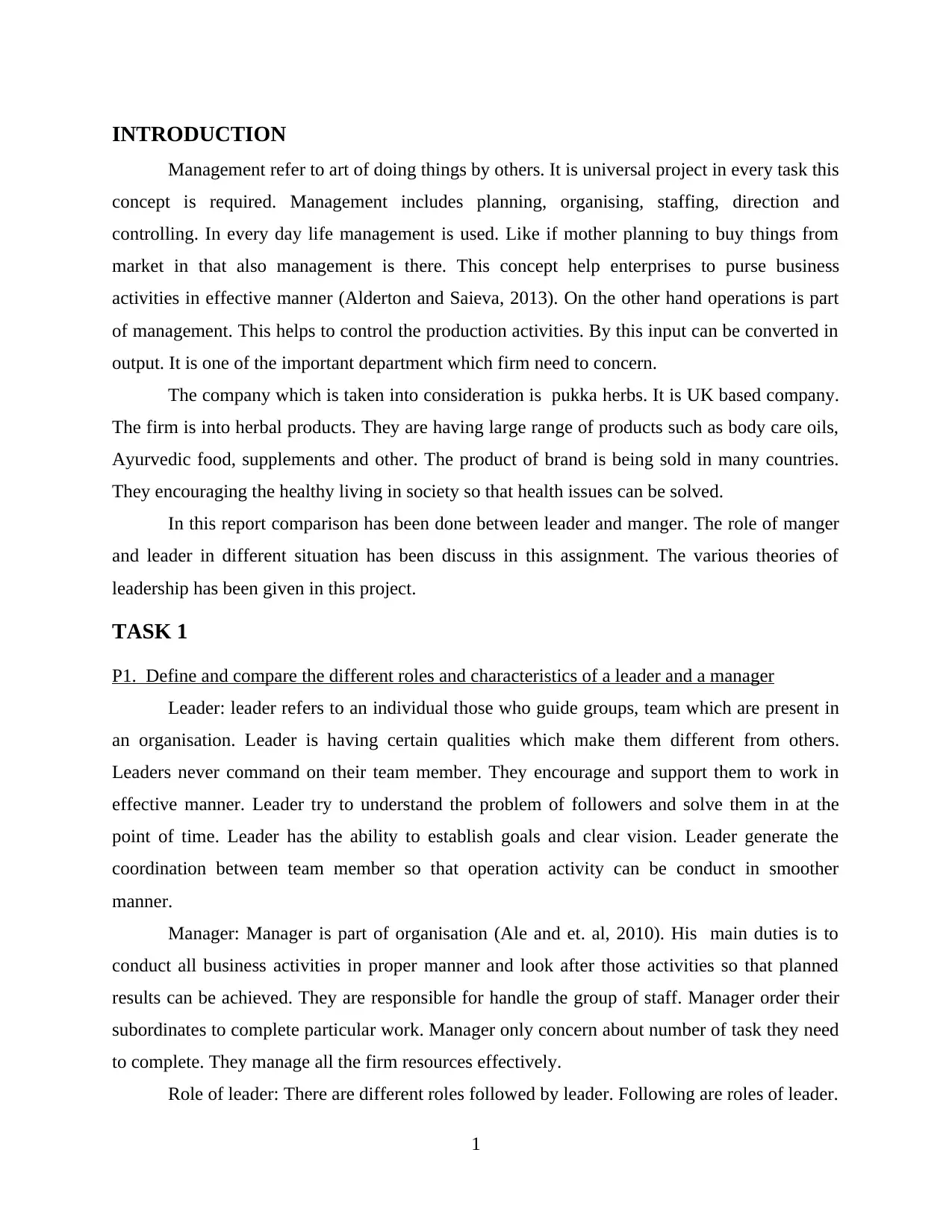
INTRODUCTION
Management refer to art of doing things by others. It is universal project in every task this
concept is required. Management includes planning, organising, staffing, direction and
controlling. In every day life management is used. Like if mother planning to buy things from
market in that also management is there. This concept help enterprises to purse business
activities in effective manner (Alderton and Saieva, 2013). On the other hand operations is part
of management. This helps to control the production activities. By this input can be converted in
output. It is one of the important department which firm need to concern.
The company which is taken into consideration is pukka herbs. It is UK based company.
The firm is into herbal products. They are having large range of products such as body care oils,
Ayurvedic food, supplements and other. The product of brand is being sold in many countries.
They encouraging the healthy living in society so that health issues can be solved.
In this report comparison has been done between leader and manger. The role of manger
and leader in different situation has been discuss in this assignment. The various theories of
leadership has been given in this project.
TASK 1
P1. Define and compare the different roles and characteristics of a leader and a manager
Leader: leader refers to an individual those who guide groups, team which are present in
an organisation. Leader is having certain qualities which make them different from others.
Leaders never command on their team member. They encourage and support them to work in
effective manner. Leader try to understand the problem of followers and solve them in at the
point of time. Leader has the ability to establish goals and clear vision. Leader generate the
coordination between team member so that operation activity can be conduct in smoother
manner.
Manager: Manager is part of organisation (Ale and et. al, 2010). His main duties is to
conduct all business activities in proper manner and look after those activities so that planned
results can be achieved. They are responsible for handle the group of staff. Manager order their
subordinates to complete particular work. Manager only concern about number of task they need
to complete. They manage all the firm resources effectively.
Role of leader: There are different roles followed by leader. Following are roles of leader.
1
Management refer to art of doing things by others. It is universal project in every task this
concept is required. Management includes planning, organising, staffing, direction and
controlling. In every day life management is used. Like if mother planning to buy things from
market in that also management is there. This concept help enterprises to purse business
activities in effective manner (Alderton and Saieva, 2013). On the other hand operations is part
of management. This helps to control the production activities. By this input can be converted in
output. It is one of the important department which firm need to concern.
The company which is taken into consideration is pukka herbs. It is UK based company.
The firm is into herbal products. They are having large range of products such as body care oils,
Ayurvedic food, supplements and other. The product of brand is being sold in many countries.
They encouraging the healthy living in society so that health issues can be solved.
In this report comparison has been done between leader and manger. The role of manger
and leader in different situation has been discuss in this assignment. The various theories of
leadership has been given in this project.
TASK 1
P1. Define and compare the different roles and characteristics of a leader and a manager
Leader: leader refers to an individual those who guide groups, team which are present in
an organisation. Leader is having certain qualities which make them different from others.
Leaders never command on their team member. They encourage and support them to work in
effective manner. Leader try to understand the problem of followers and solve them in at the
point of time. Leader has the ability to establish goals and clear vision. Leader generate the
coordination between team member so that operation activity can be conduct in smoother
manner.
Manager: Manager is part of organisation (Ale and et. al, 2010). His main duties is to
conduct all business activities in proper manner and look after those activities so that planned
results can be achieved. They are responsible for handle the group of staff. Manager order their
subordinates to complete particular work. Manager only concern about number of task they need
to complete. They manage all the firm resources effectively.
Role of leader: There are different roles followed by leader. Following are roles of leader.
1
Paraphrase This Document
Need a fresh take? Get an instant paraphrase of this document with our AI Paraphraser
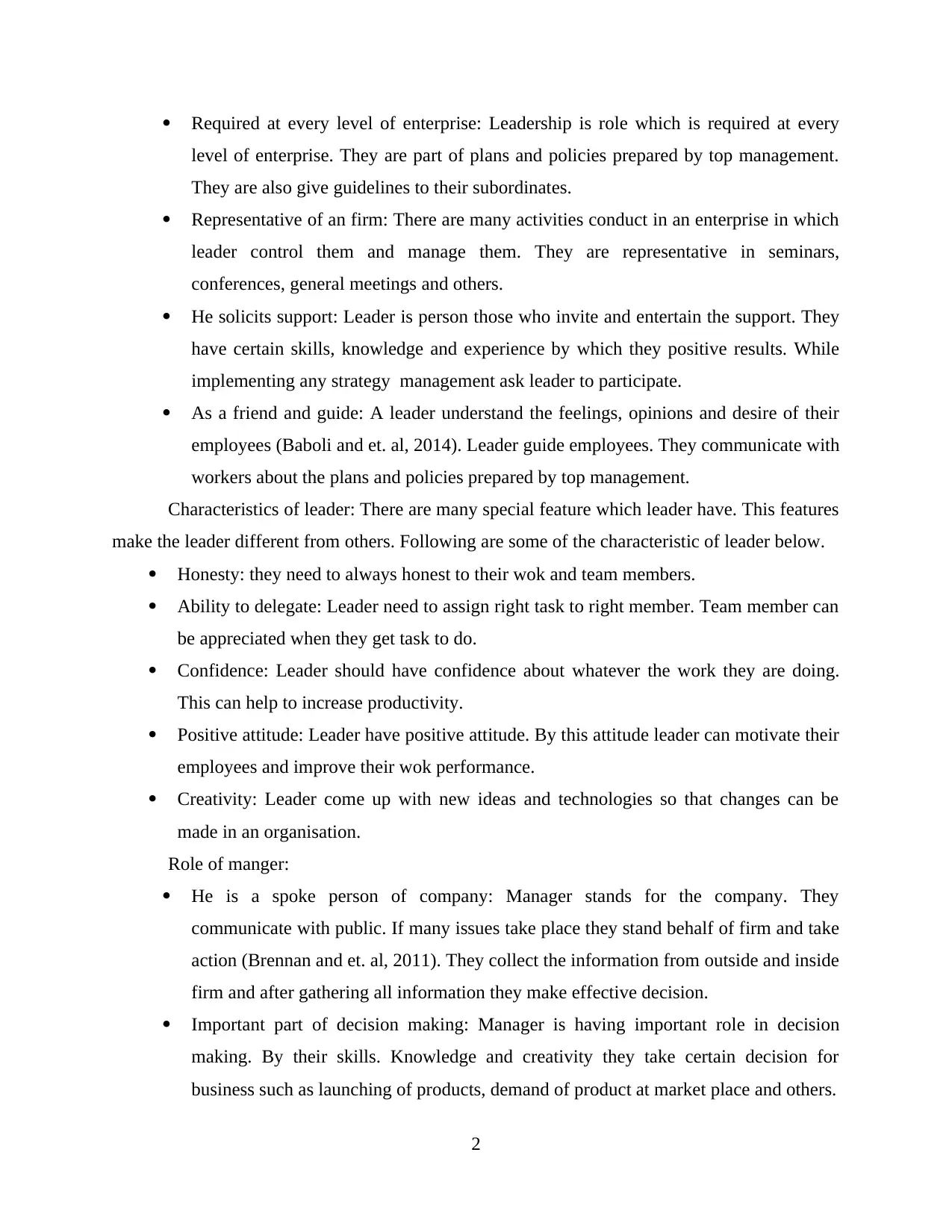
Required at every level of enterprise: Leadership is role which is required at every
level of enterprise. They are part of plans and policies prepared by top management.
They are also give guidelines to their subordinates.
Representative of an firm: There are many activities conduct in an enterprise in which
leader control them and manage them. They are representative in seminars,
conferences, general meetings and others.
He solicits support: Leader is person those who invite and entertain the support. They
have certain skills, knowledge and experience by which they positive results. While
implementing any strategy management ask leader to participate.
As a friend and guide: A leader understand the feelings, opinions and desire of their
employees (Baboli and et. al, 2014). Leader guide employees. They communicate with
workers about the plans and policies prepared by top management.
Characteristics of leader: There are many special feature which leader have. This features
make the leader different from others. Following are some of the characteristic of leader below.
Honesty: they need to always honest to their wok and team members.
Ability to delegate: Leader need to assign right task to right member. Team member can
be appreciated when they get task to do.
Confidence: Leader should have confidence about whatever the work they are doing.
This can help to increase productivity.
Positive attitude: Leader have positive attitude. By this attitude leader can motivate their
employees and improve their wok performance.
Creativity: Leader come up with new ideas and technologies so that changes can be
made in an organisation.
Role of manger:
He is a spoke person of company: Manager stands for the company. They
communicate with public. If many issues take place they stand behalf of firm and take
action (Brennan and et. al, 2011). They collect the information from outside and inside
firm and after gathering all information they make effective decision.
Important part of decision making: Manager is having important role in decision
making. By their skills. Knowledge and creativity they take certain decision for
business such as launching of products, demand of product at market place and others.
2
level of enterprise. They are part of plans and policies prepared by top management.
They are also give guidelines to their subordinates.
Representative of an firm: There are many activities conduct in an enterprise in which
leader control them and manage them. They are representative in seminars,
conferences, general meetings and others.
He solicits support: Leader is person those who invite and entertain the support. They
have certain skills, knowledge and experience by which they positive results. While
implementing any strategy management ask leader to participate.
As a friend and guide: A leader understand the feelings, opinions and desire of their
employees (Baboli and et. al, 2014). Leader guide employees. They communicate with
workers about the plans and policies prepared by top management.
Characteristics of leader: There are many special feature which leader have. This features
make the leader different from others. Following are some of the characteristic of leader below.
Honesty: they need to always honest to their wok and team members.
Ability to delegate: Leader need to assign right task to right member. Team member can
be appreciated when they get task to do.
Confidence: Leader should have confidence about whatever the work they are doing.
This can help to increase productivity.
Positive attitude: Leader have positive attitude. By this attitude leader can motivate their
employees and improve their wok performance.
Creativity: Leader come up with new ideas and technologies so that changes can be
made in an organisation.
Role of manger:
He is a spoke person of company: Manager stands for the company. They
communicate with public. If many issues take place they stand behalf of firm and take
action (Brennan and et. al, 2011). They collect the information from outside and inside
firm and after gathering all information they make effective decision.
Important part of decision making: Manager is having important role in decision
making. By their skills. Knowledge and creativity they take certain decision for
business such as launching of products, demand of product at market place and others.
2
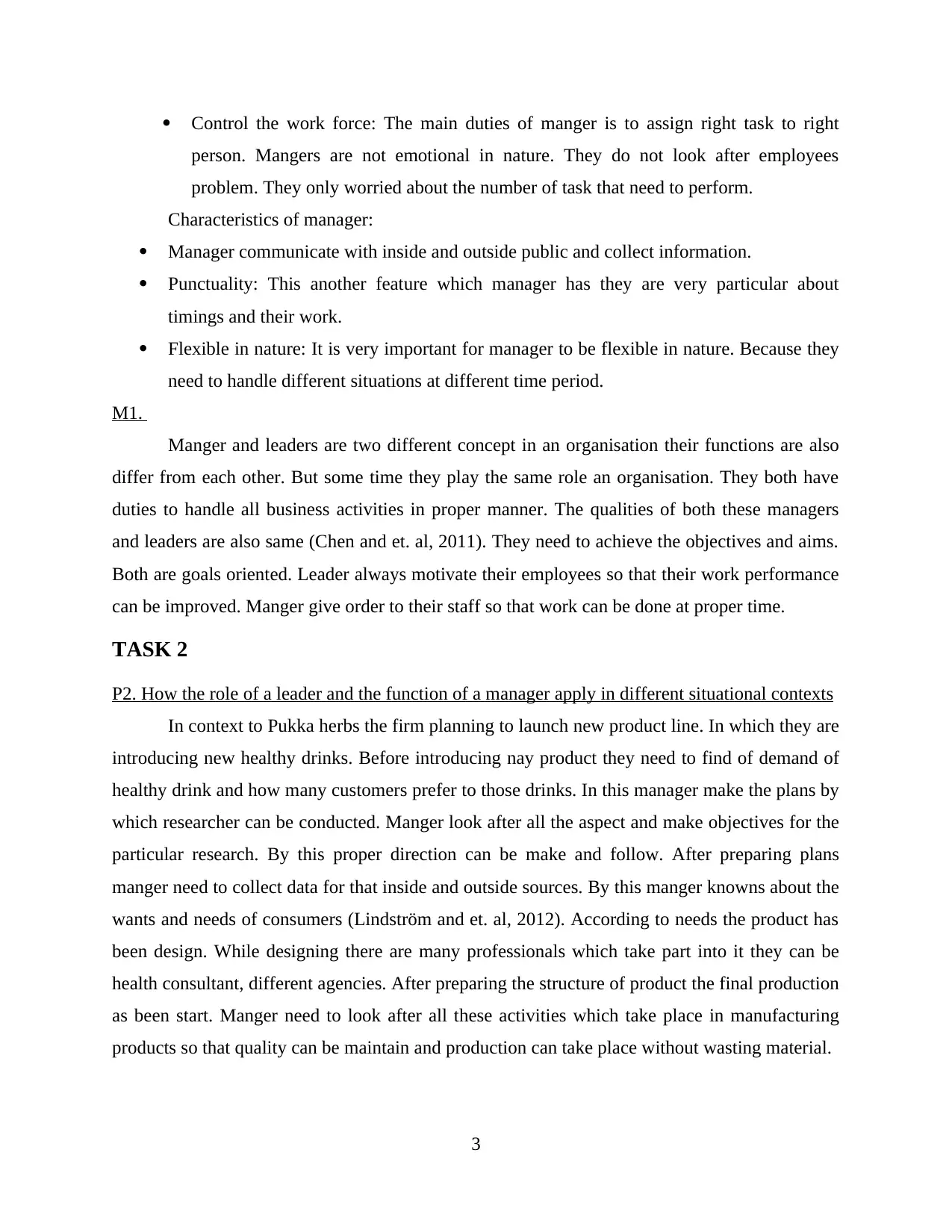
Control the work force: The main duties of manger is to assign right task to right
person. Mangers are not emotional in nature. They do not look after employees
problem. They only worried about the number of task that need to perform.
Characteristics of manager:
Manager communicate with inside and outside public and collect information.
Punctuality: This another feature which manager has they are very particular about
timings and their work.
Flexible in nature: It is very important for manager to be flexible in nature. Because they
need to handle different situations at different time period.
M1.
Manger and leaders are two different concept in an organisation their functions are also
differ from each other. But some time they play the same role an organisation. They both have
duties to handle all business activities in proper manner. The qualities of both these managers
and leaders are also same (Chen and et. al, 2011). They need to achieve the objectives and aims.
Both are goals oriented. Leader always motivate their employees so that their work performance
can be improved. Manger give order to their staff so that work can be done at proper time.
TASK 2
P2. How the role of a leader and the function of a manager apply in different situational contexts
In context to Pukka herbs the firm planning to launch new product line. In which they are
introducing new healthy drinks. Before introducing nay product they need to find of demand of
healthy drink and how many customers prefer to those drinks. In this manager make the plans by
which researcher can be conducted. Manger look after all the aspect and make objectives for the
particular research. By this proper direction can be make and follow. After preparing plans
manger need to collect data for that inside and outside sources. By this manger knowns about the
wants and needs of consumers (Lindström and et. al, 2012). According to needs the product has
been design. While designing there are many professionals which take part into it they can be
health consultant, different agencies. After preparing the structure of product the final production
as been start. Manger need to look after all these activities which take place in manufacturing
products so that quality can be maintain and production can take place without wasting material.
3
person. Mangers are not emotional in nature. They do not look after employees
problem. They only worried about the number of task that need to perform.
Characteristics of manager:
Manager communicate with inside and outside public and collect information.
Punctuality: This another feature which manager has they are very particular about
timings and their work.
Flexible in nature: It is very important for manager to be flexible in nature. Because they
need to handle different situations at different time period.
M1.
Manger and leaders are two different concept in an organisation their functions are also
differ from each other. But some time they play the same role an organisation. They both have
duties to handle all business activities in proper manner. The qualities of both these managers
and leaders are also same (Chen and et. al, 2011). They need to achieve the objectives and aims.
Both are goals oriented. Leader always motivate their employees so that their work performance
can be improved. Manger give order to their staff so that work can be done at proper time.
TASK 2
P2. How the role of a leader and the function of a manager apply in different situational contexts
In context to Pukka herbs the firm planning to launch new product line. In which they are
introducing new healthy drinks. Before introducing nay product they need to find of demand of
healthy drink and how many customers prefer to those drinks. In this manager make the plans by
which researcher can be conducted. Manger look after all the aspect and make objectives for the
particular research. By this proper direction can be make and follow. After preparing plans
manger need to collect data for that inside and outside sources. By this manger knowns about the
wants and needs of consumers (Lindström and et. al, 2012). According to needs the product has
been design. While designing there are many professionals which take part into it they can be
health consultant, different agencies. After preparing the structure of product the final production
as been start. Manger need to look after all these activities which take place in manufacturing
products so that quality can be maintain and production can take place without wasting material.
3
⊘ This is a preview!⊘
Do you want full access?
Subscribe today to unlock all pages.

Trusted by 1+ million students worldwide
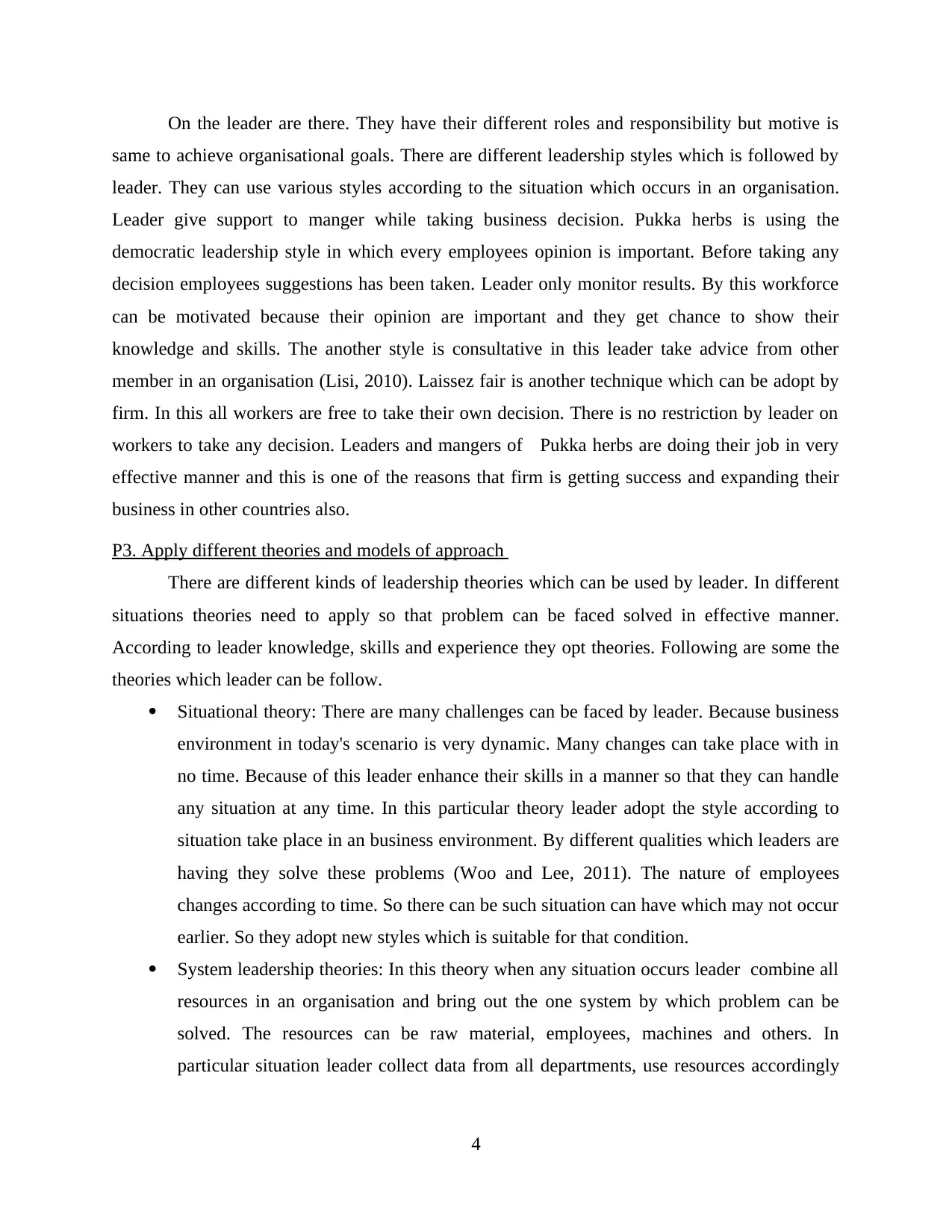
On the leader are there. They have their different roles and responsibility but motive is
same to achieve organisational goals. There are different leadership styles which is followed by
leader. They can use various styles according to the situation which occurs in an organisation.
Leader give support to manger while taking business decision. Pukka herbs is using the
democratic leadership style in which every employees opinion is important. Before taking any
decision employees suggestions has been taken. Leader only monitor results. By this workforce
can be motivated because their opinion are important and they get chance to show their
knowledge and skills. The another style is consultative in this leader take advice from other
member in an organisation (Lisi, 2010). Laissez fair is another technique which can be adopt by
firm. In this all workers are free to take their own decision. There is no restriction by leader on
workers to take any decision. Leaders and mangers of Pukka herbs are doing their job in very
effective manner and this is one of the reasons that firm is getting success and expanding their
business in other countries also.
P3. Apply different theories and models of approach
There are different kinds of leadership theories which can be used by leader. In different
situations theories need to apply so that problem can be faced solved in effective manner.
According to leader knowledge, skills and experience they opt theories. Following are some the
theories which leader can be follow.
Situational theory: There are many challenges can be faced by leader. Because business
environment in today's scenario is very dynamic. Many changes can take place with in
no time. Because of this leader enhance their skills in a manner so that they can handle
any situation at any time. In this particular theory leader adopt the style according to
situation take place in an business environment. By different qualities which leaders are
having they solve these problems (Woo and Lee, 2011). The nature of employees
changes according to time. So there can be such situation can have which may not occur
earlier. So they adopt new styles which is suitable for that condition.
System leadership theories: In this theory when any situation occurs leader combine all
resources in an organisation and bring out the one system by which problem can be
solved. The resources can be raw material, employees, machines and others. In
particular situation leader collect data from all departments, use resources accordingly
4
same to achieve organisational goals. There are different leadership styles which is followed by
leader. They can use various styles according to the situation which occurs in an organisation.
Leader give support to manger while taking business decision. Pukka herbs is using the
democratic leadership style in which every employees opinion is important. Before taking any
decision employees suggestions has been taken. Leader only monitor results. By this workforce
can be motivated because their opinion are important and they get chance to show their
knowledge and skills. The another style is consultative in this leader take advice from other
member in an organisation (Lisi, 2010). Laissez fair is another technique which can be adopt by
firm. In this all workers are free to take their own decision. There is no restriction by leader on
workers to take any decision. Leaders and mangers of Pukka herbs are doing their job in very
effective manner and this is one of the reasons that firm is getting success and expanding their
business in other countries also.
P3. Apply different theories and models of approach
There are different kinds of leadership theories which can be used by leader. In different
situations theories need to apply so that problem can be faced solved in effective manner.
According to leader knowledge, skills and experience they opt theories. Following are some the
theories which leader can be follow.
Situational theory: There are many challenges can be faced by leader. Because business
environment in today's scenario is very dynamic. Many changes can take place with in
no time. Because of this leader enhance their skills in a manner so that they can handle
any situation at any time. In this particular theory leader adopt the style according to
situation take place in an business environment. By different qualities which leaders are
having they solve these problems (Woo and Lee, 2011). The nature of employees
changes according to time. So there can be such situation can have which may not occur
earlier. So they adopt new styles which is suitable for that condition.
System leadership theories: In this theory when any situation occurs leader combine all
resources in an organisation and bring out the one system by which problem can be
solved. The resources can be raw material, employees, machines and others. In
particular situation leader collect data from all departments, use resources accordingly
4
Paraphrase This Document
Need a fresh take? Get an instant paraphrase of this document with our AI Paraphraser
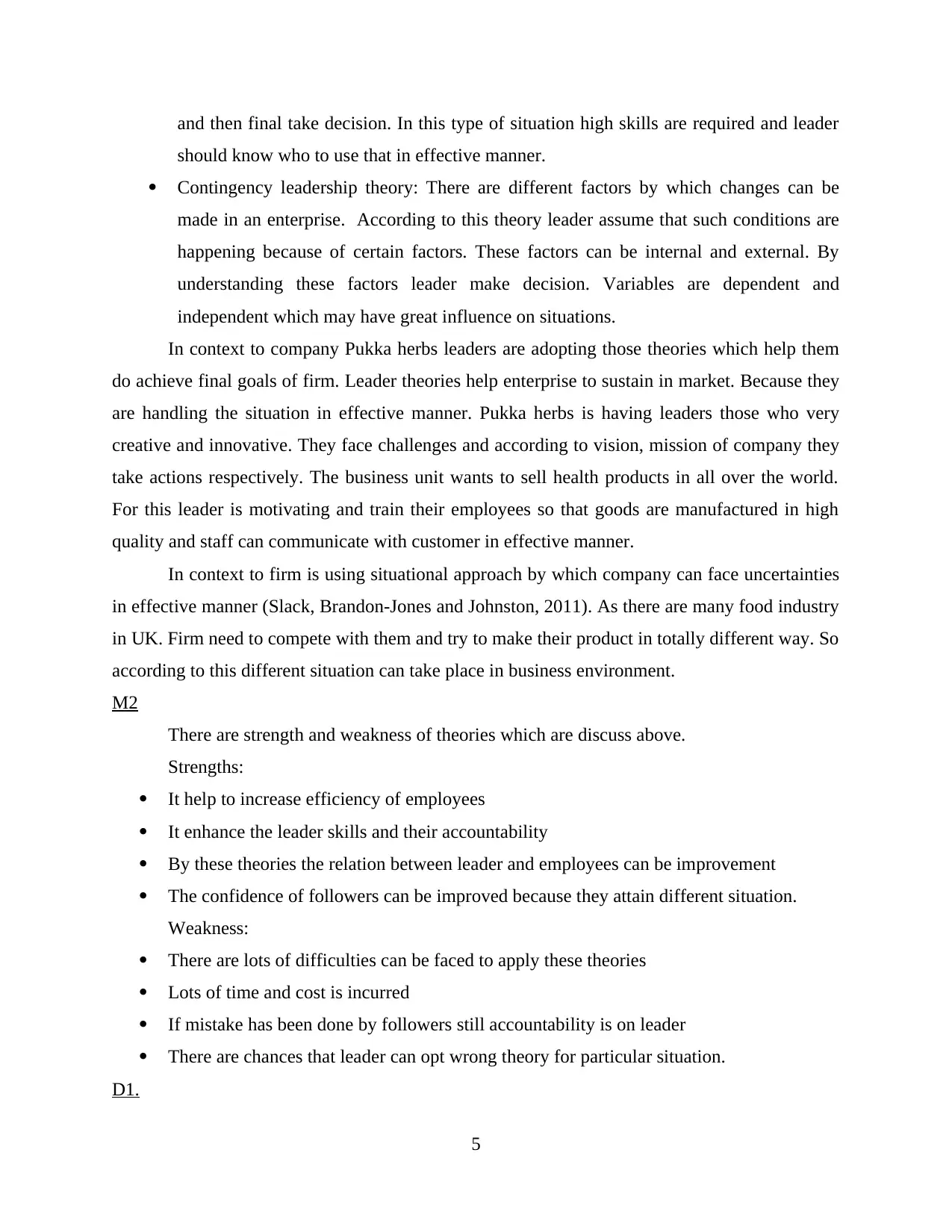
and then final take decision. In this type of situation high skills are required and leader
should know who to use that in effective manner.
Contingency leadership theory: There are different factors by which changes can be
made in an enterprise. According to this theory leader assume that such conditions are
happening because of certain factors. These factors can be internal and external. By
understanding these factors leader make decision. Variables are dependent and
independent which may have great influence on situations.
In context to company Pukka herbs leaders are adopting those theories which help them
do achieve final goals of firm. Leader theories help enterprise to sustain in market. Because they
are handling the situation in effective manner. Pukka herbs is having leaders those who very
creative and innovative. They face challenges and according to vision, mission of company they
take actions respectively. The business unit wants to sell health products in all over the world.
For this leader is motivating and train their employees so that goods are manufactured in high
quality and staff can communicate with customer in effective manner.
In context to firm is using situational approach by which company can face uncertainties
in effective manner (Slack, Brandon-Jones and Johnston, 2011). As there are many food industry
in UK. Firm need to compete with them and try to make their product in totally different way. So
according to this different situation can take place in business environment.
M2
There are strength and weakness of theories which are discuss above.
Strengths:
It help to increase efficiency of employees
It enhance the leader skills and their accountability
By these theories the relation between leader and employees can be improvement
The confidence of followers can be improved because they attain different situation.
Weakness:
There are lots of difficulties can be faced to apply these theories
Lots of time and cost is incurred
If mistake has been done by followers still accountability is on leader
There are chances that leader can opt wrong theory for particular situation.
D1.
5
should know who to use that in effective manner.
Contingency leadership theory: There are different factors by which changes can be
made in an enterprise. According to this theory leader assume that such conditions are
happening because of certain factors. These factors can be internal and external. By
understanding these factors leader make decision. Variables are dependent and
independent which may have great influence on situations.
In context to company Pukka herbs leaders are adopting those theories which help them
do achieve final goals of firm. Leader theories help enterprise to sustain in market. Because they
are handling the situation in effective manner. Pukka herbs is having leaders those who very
creative and innovative. They face challenges and according to vision, mission of company they
take actions respectively. The business unit wants to sell health products in all over the world.
For this leader is motivating and train their employees so that goods are manufactured in high
quality and staff can communicate with customer in effective manner.
In context to firm is using situational approach by which company can face uncertainties
in effective manner (Slack, Brandon-Jones and Johnston, 2011). As there are many food industry
in UK. Firm need to compete with them and try to make their product in totally different way. So
according to this different situation can take place in business environment.
M2
There are strength and weakness of theories which are discuss above.
Strengths:
It help to increase efficiency of employees
It enhance the leader skills and their accountability
By these theories the relation between leader and employees can be improvement
The confidence of followers can be improved because they attain different situation.
Weakness:
There are lots of difficulties can be faced to apply these theories
Lots of time and cost is incurred
If mistake has been done by followers still accountability is on leader
There are chances that leader can opt wrong theory for particular situation.
D1.
5
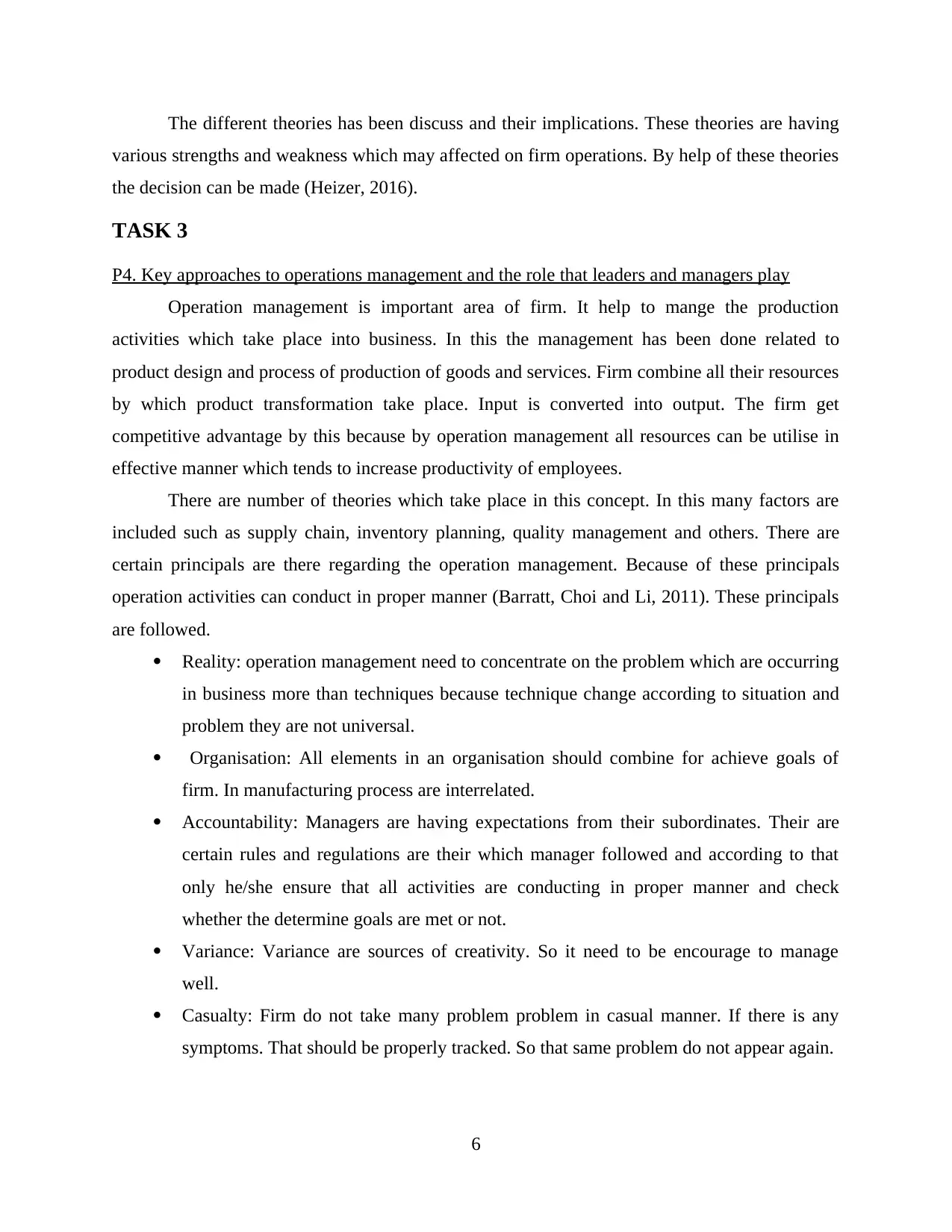
The different theories has been discuss and their implications. These theories are having
various strengths and weakness which may affected on firm operations. By help of these theories
the decision can be made (Heizer, 2016).
TASK 3
P4. Key approaches to operations management and the role that leaders and managers play
Operation management is important area of firm. It help to mange the production
activities which take place into business. In this the management has been done related to
product design and process of production of goods and services. Firm combine all their resources
by which product transformation take place. Input is converted into output. The firm get
competitive advantage by this because by operation management all resources can be utilise in
effective manner which tends to increase productivity of employees.
There are number of theories which take place in this concept. In this many factors are
included such as supply chain, inventory planning, quality management and others. There are
certain principals are there regarding the operation management. Because of these principals
operation activities can conduct in proper manner (Barratt, Choi and Li, 2011). These principals
are followed.
Reality: operation management need to concentrate on the problem which are occurring
in business more than techniques because technique change according to situation and
problem they are not universal.
Organisation: All elements in an organisation should combine for achieve goals of
firm. In manufacturing process are interrelated.
Accountability: Managers are having expectations from their subordinates. Their are
certain rules and regulations are their which manager followed and according to that
only he/she ensure that all activities are conducting in proper manner and check
whether the determine goals are met or not.
Variance: Variance are sources of creativity. So it need to be encourage to manage
well.
Casualty: Firm do not take many problem problem in casual manner. If there is any
symptoms. That should be properly tracked. So that same problem do not appear again.
6
various strengths and weakness which may affected on firm operations. By help of these theories
the decision can be made (Heizer, 2016).
TASK 3
P4. Key approaches to operations management and the role that leaders and managers play
Operation management is important area of firm. It help to mange the production
activities which take place into business. In this the management has been done related to
product design and process of production of goods and services. Firm combine all their resources
by which product transformation take place. Input is converted into output. The firm get
competitive advantage by this because by operation management all resources can be utilise in
effective manner which tends to increase productivity of employees.
There are number of theories which take place in this concept. In this many factors are
included such as supply chain, inventory planning, quality management and others. There are
certain principals are there regarding the operation management. Because of these principals
operation activities can conduct in proper manner (Barratt, Choi and Li, 2011). These principals
are followed.
Reality: operation management need to concentrate on the problem which are occurring
in business more than techniques because technique change according to situation and
problem they are not universal.
Organisation: All elements in an organisation should combine for achieve goals of
firm. In manufacturing process are interrelated.
Accountability: Managers are having expectations from their subordinates. Their are
certain rules and regulations are their which manager followed and according to that
only he/she ensure that all activities are conducting in proper manner and check
whether the determine goals are met or not.
Variance: Variance are sources of creativity. So it need to be encourage to manage
well.
Casualty: Firm do not take many problem problem in casual manner. If there is any
symptoms. That should be properly tracked. So that same problem do not appear again.
6
⊘ This is a preview!⊘
Do you want full access?
Subscribe today to unlock all pages.

Trusted by 1+ million students worldwide
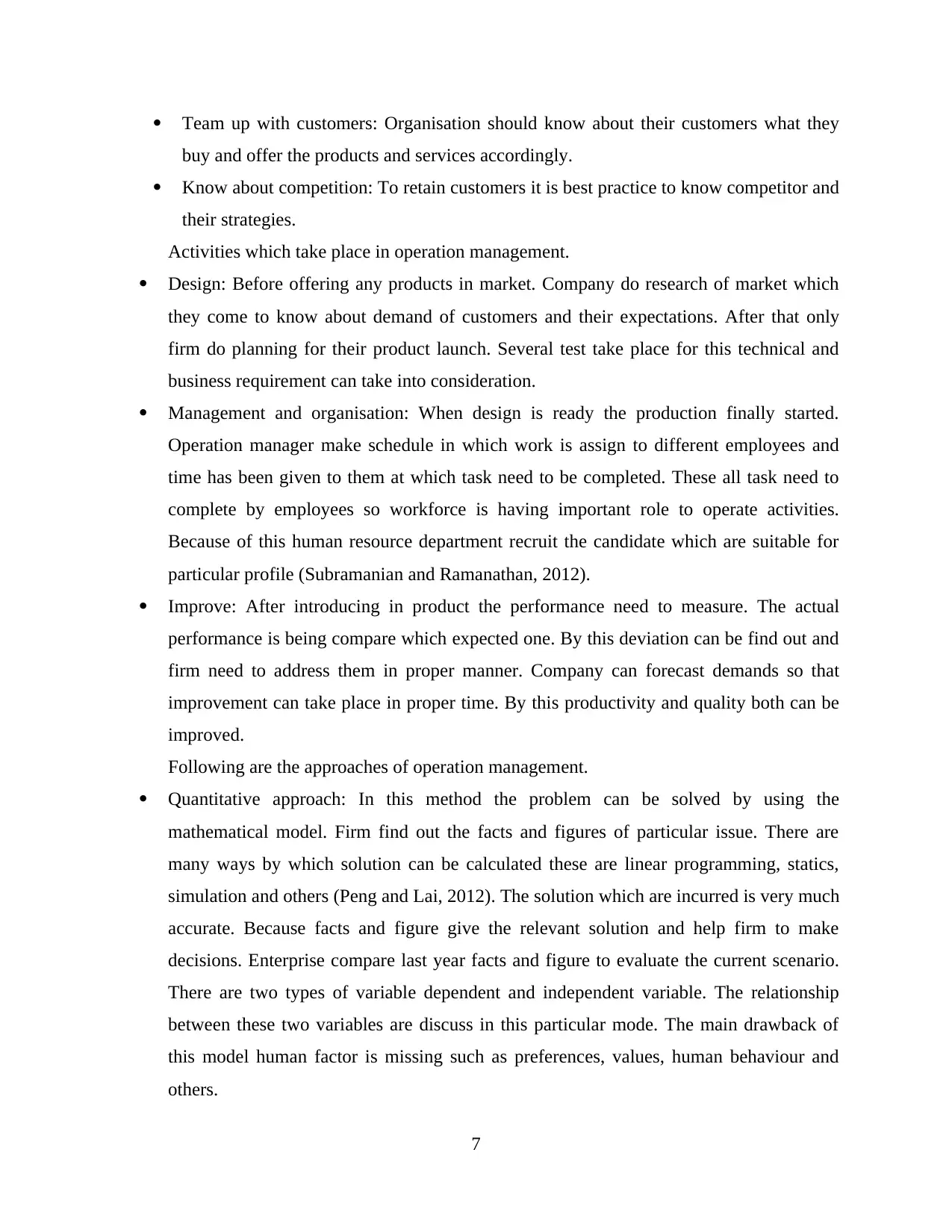
Team up with customers: Organisation should know about their customers what they
buy and offer the products and services accordingly.
Know about competition: To retain customers it is best practice to know competitor and
their strategies.
Activities which take place in operation management.
Design: Before offering any products in market. Company do research of market which
they come to know about demand of customers and their expectations. After that only
firm do planning for their product launch. Several test take place for this technical and
business requirement can take into consideration.
Management and organisation: When design is ready the production finally started.
Operation manager make schedule in which work is assign to different employees and
time has been given to them at which task need to be completed. These all task need to
complete by employees so workforce is having important role to operate activities.
Because of this human resource department recruit the candidate which are suitable for
particular profile (Subramanian and Ramanathan, 2012).
Improve: After introducing in product the performance need to measure. The actual
performance is being compare which expected one. By this deviation can be find out and
firm need to address them in proper manner. Company can forecast demands so that
improvement can take place in proper time. By this productivity and quality both can be
improved.
Following are the approaches of operation management.
Quantitative approach: In this method the problem can be solved by using the
mathematical model. Firm find out the facts and figures of particular issue. There are
many ways by which solution can be calculated these are linear programming, statics,
simulation and others (Peng and Lai, 2012). The solution which are incurred is very much
accurate. Because facts and figure give the relevant solution and help firm to make
decisions. Enterprise compare last year facts and figure to evaluate the current scenario.
There are two types of variable dependent and independent variable. The relationship
between these two variables are discuss in this particular mode. The main drawback of
this model human factor is missing such as preferences, values, human behaviour and
others.
7
buy and offer the products and services accordingly.
Know about competition: To retain customers it is best practice to know competitor and
their strategies.
Activities which take place in operation management.
Design: Before offering any products in market. Company do research of market which
they come to know about demand of customers and their expectations. After that only
firm do planning for their product launch. Several test take place for this technical and
business requirement can take into consideration.
Management and organisation: When design is ready the production finally started.
Operation manager make schedule in which work is assign to different employees and
time has been given to them at which task need to be completed. These all task need to
complete by employees so workforce is having important role to operate activities.
Because of this human resource department recruit the candidate which are suitable for
particular profile (Subramanian and Ramanathan, 2012).
Improve: After introducing in product the performance need to measure. The actual
performance is being compare which expected one. By this deviation can be find out and
firm need to address them in proper manner. Company can forecast demands so that
improvement can take place in proper time. By this productivity and quality both can be
improved.
Following are the approaches of operation management.
Quantitative approach: In this method the problem can be solved by using the
mathematical model. Firm find out the facts and figures of particular issue. There are
many ways by which solution can be calculated these are linear programming, statics,
simulation and others (Peng and Lai, 2012). The solution which are incurred is very much
accurate. Because facts and figure give the relevant solution and help firm to make
decisions. Enterprise compare last year facts and figure to evaluate the current scenario.
There are two types of variable dependent and independent variable. The relationship
between these two variables are discuss in this particular mode. The main drawback of
this model human factor is missing such as preferences, values, human behaviour and
others.
7
Paraphrase This Document
Need a fresh take? Get an instant paraphrase of this document with our AI Paraphraser
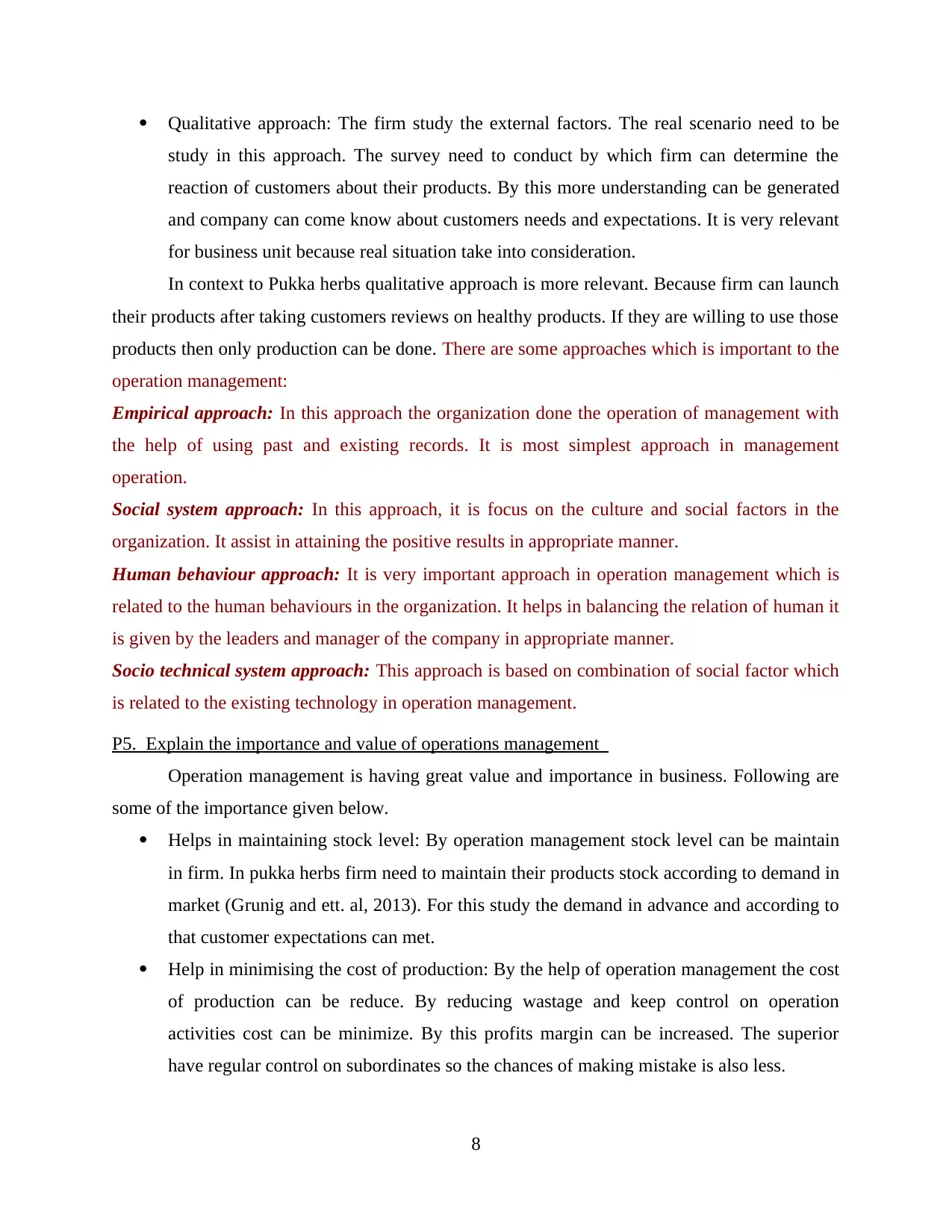
Qualitative approach: The firm study the external factors. The real scenario need to be
study in this approach. The survey need to conduct by which firm can determine the
reaction of customers about their products. By this more understanding can be generated
and company can come know about customers needs and expectations. It is very relevant
for business unit because real situation take into consideration.
In context to Pukka herbs qualitative approach is more relevant. Because firm can launch
their products after taking customers reviews on healthy products. If they are willing to use those
products then only production can be done. There are some approaches which is important to the
operation management:
Empirical approach: In this approach the organization done the operation of management with
the help of using past and existing records. It is most simplest approach in management
operation.
Social system approach: In this approach, it is focus on the culture and social factors in the
organization. It assist in attaining the positive results in appropriate manner.
Human behaviour approach: It is very important approach in operation management which is
related to the human behaviours in the organization. It helps in balancing the relation of human it
is given by the leaders and manager of the company in appropriate manner.
Socio technical system approach: This approach is based on combination of social factor which
is related to the existing technology in operation management.
P5. Explain the importance and value of operations management
Operation management is having great value and importance in business. Following are
some of the importance given below.
Helps in maintaining stock level: By operation management stock level can be maintain
in firm. In pukka herbs firm need to maintain their products stock according to demand in
market (Grunig and ett. al, 2013). For this study the demand in advance and according to
that customer expectations can met.
Help in minimising the cost of production: By the help of operation management the cost
of production can be reduce. By reducing wastage and keep control on operation
activities cost can be minimize. By this profits margin can be increased. The superior
have regular control on subordinates so the chances of making mistake is also less.
8
study in this approach. The survey need to conduct by which firm can determine the
reaction of customers about their products. By this more understanding can be generated
and company can come know about customers needs and expectations. It is very relevant
for business unit because real situation take into consideration.
In context to Pukka herbs qualitative approach is more relevant. Because firm can launch
their products after taking customers reviews on healthy products. If they are willing to use those
products then only production can be done. There are some approaches which is important to the
operation management:
Empirical approach: In this approach the organization done the operation of management with
the help of using past and existing records. It is most simplest approach in management
operation.
Social system approach: In this approach, it is focus on the culture and social factors in the
organization. It assist in attaining the positive results in appropriate manner.
Human behaviour approach: It is very important approach in operation management which is
related to the human behaviours in the organization. It helps in balancing the relation of human it
is given by the leaders and manager of the company in appropriate manner.
Socio technical system approach: This approach is based on combination of social factor which
is related to the existing technology in operation management.
P5. Explain the importance and value of operations management
Operation management is having great value and importance in business. Following are
some of the importance given below.
Helps in maintaining stock level: By operation management stock level can be maintain
in firm. In pukka herbs firm need to maintain their products stock according to demand in
market (Grunig and ett. al, 2013). For this study the demand in advance and according to
that customer expectations can met.
Help in minimising the cost of production: By the help of operation management the cost
of production can be reduce. By reducing wastage and keep control on operation
activities cost can be minimize. By this profits margin can be increased. The superior
have regular control on subordinates so the chances of making mistake is also less.
8
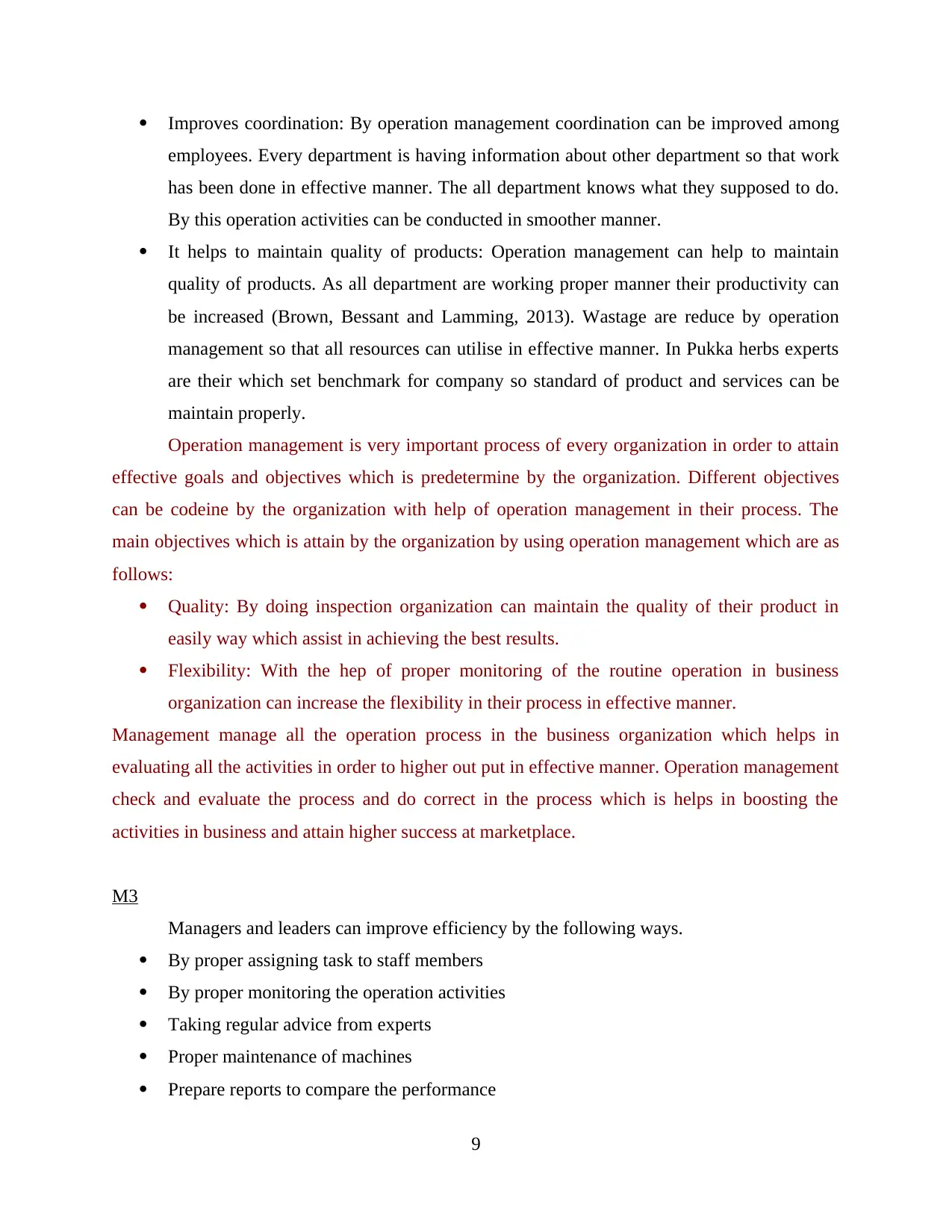
Improves coordination: By operation management coordination can be improved among
employees. Every department is having information about other department so that work
has been done in effective manner. The all department knows what they supposed to do.
By this operation activities can be conducted in smoother manner.
It helps to maintain quality of products: Operation management can help to maintain
quality of products. As all department are working proper manner their productivity can
be increased (Brown, Bessant and Lamming, 2013). Wastage are reduce by operation
management so that all resources can utilise in effective manner. In Pukka herbs experts
are their which set benchmark for company so standard of product and services can be
maintain properly.
Operation management is very important process of every organization in order to attain
effective goals and objectives which is predetermine by the organization. Different objectives
can be codeine by the organization with help of operation management in their process. The
main objectives which is attain by the organization by using operation management which are as
follows:
Quality: By doing inspection organization can maintain the quality of their product in
easily way which assist in achieving the best results.
Flexibility: With the hep of proper monitoring of the routine operation in business
organization can increase the flexibility in their process in effective manner.
Management manage all the operation process in the business organization which helps in
evaluating all the activities in order to higher out put in effective manner. Operation management
check and evaluate the process and do correct in the process which is helps in boosting the
activities in business and attain higher success at marketplace.
M3
Managers and leaders can improve efficiency by the following ways.
By proper assigning task to staff members
By proper monitoring the operation activities
Taking regular advice from experts
Proper maintenance of machines
Prepare reports to compare the performance
9
employees. Every department is having information about other department so that work
has been done in effective manner. The all department knows what they supposed to do.
By this operation activities can be conducted in smoother manner.
It helps to maintain quality of products: Operation management can help to maintain
quality of products. As all department are working proper manner their productivity can
be increased (Brown, Bessant and Lamming, 2013). Wastage are reduce by operation
management so that all resources can utilise in effective manner. In Pukka herbs experts
are their which set benchmark for company so standard of product and services can be
maintain properly.
Operation management is very important process of every organization in order to attain
effective goals and objectives which is predetermine by the organization. Different objectives
can be codeine by the organization with help of operation management in their process. The
main objectives which is attain by the organization by using operation management which are as
follows:
Quality: By doing inspection organization can maintain the quality of their product in
easily way which assist in achieving the best results.
Flexibility: With the hep of proper monitoring of the routine operation in business
organization can increase the flexibility in their process in effective manner.
Management manage all the operation process in the business organization which helps in
evaluating all the activities in order to higher out put in effective manner. Operation management
check and evaluate the process and do correct in the process which is helps in boosting the
activities in business and attain higher success at marketplace.
M3
Managers and leaders can improve efficiency by the following ways.
By proper assigning task to staff members
By proper monitoring the operation activities
Taking regular advice from experts
Proper maintenance of machines
Prepare reports to compare the performance
9
⊘ This is a preview!⊘
Do you want full access?
Subscribe today to unlock all pages.

Trusted by 1+ million students worldwide
1 out of 16
Related Documents
Your All-in-One AI-Powered Toolkit for Academic Success.
+13062052269
info@desklib.com
Available 24*7 on WhatsApp / Email
![[object Object]](/_next/static/media/star-bottom.7253800d.svg)
Unlock your academic potential
Copyright © 2020–2026 A2Z Services. All Rights Reserved. Developed and managed by ZUCOL.





